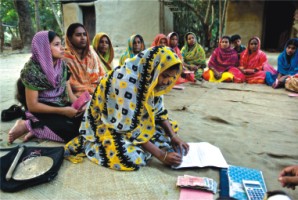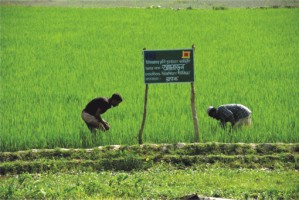Special Feature
Changing Lives
Jessica Mudditt
 |
| A BRAC health worker in rural Bangladesh. |
Fazle Hasan Abed, the founder and chairperson of the world's largest NGO, was last week informed that he is to be knighted by the Queen of England for his services to alleviating poverty in Bangladesh and abroad. Abed is the first Bangladeshi to receive the honour since 1947, though he is the second person in his family to be knighted. In 1913 his great uncle, Justice Nawab Sir Syed Shamsul Huda also received a knighthood.
Under Abed's leadership, BRAC's massive contribution to development has long been recognised by the international community. BRAC has won multiple awards and Abed has received honourary degrees from Yale, Columbia and Oxford Universities, amongst other accolades.
 |
Fazle Hasan Abed
Photo: brac/shehab uddin/drik |
Despite the congratulatory flower bouqets and cards that currently bedeck his nineteeth floor office, Abed's outlook on being knighted is pragmatic. He says, "Being a knight won't make a difference to my work in Bangladesh, but it will make a difference when I go to Africa and I wish to see the president of Tanzania or Uganda. Having a "Sir" in front of my name will help me to get an appointment."
Abed is clearly focused on expanding BRAC's presence globally. It currently operates in eight countries outside Bangladesh, but Abed would like to increase this to around 20 or 30.
In 2002 BRAC undertook its first overseas project when it began operating in Afghanistan. Abed, who regularly visits Afghanistan, explained the different approach BRAC adopts when working outside Bangladesh. He said, "We are trying to get Afghans involved in their own development and we are trying to get them to work with us. We currently have 3,900 staff -- of these, only 180 are Bangladeshis and the rest are Afghan. Ultimately it will only be Afghans working for BRAC in Afghanistan."
He was also quick to praise the efforts of BRAC staff in the war-torn country, saying, "There are more security issues and freedom of movement is restricted. It takes a lot of courage and dedication to work under such circumstances."
BRAC UK is also working with Bangladeshi women in east London. It provides classes in Bangla about banking and savings, so that women feel confident about entering a bank to open savings accounts and therefore gain greater independence.
Haiti is another nation BRAC is focused on assisting in the near future, though it too has its own particular challenges. Abed says, "The government in Haiti is very fragile. This has been one of our problems. There are also very few institutions that people can depend on. I want to build an institution that people can depend on. And I hope that by the time this is achieved, the government will gradually become energised and properly run."
Abed is grateful for the "political space" BRAC has been granted in Bangladesh. He says, "In many countries NGOs are not allowed to be so large. This government has taken a very open and liberal view of having partners outside themselves to work in development."
This resonates with Abed's own beliefs about development work. He says, "I believe that the development of a country is not a duty to be perfomed by governments alone. The people must be involved. And the institutions, whether they are government, private, or non-profit, must contribute to development."
However, Abed is concerned by the quality of education being provided to millions of students in Bangladesh, as he believes it is one of the single most important factors in alleviating poverty. He said, "Simply going to school is not enough -- it needs to be the right type of education so that our students are able to compete in the global economy. We must raise the standards at primary, secondary and university levels." Abed is a staunch advocate of introducing information technology into schools, claiming that it would hasten the process of raising the quality of education.
When discussing the impacts of climate change on Bangladesh, thought to be the most severe in the world, Abed describes it as a "challenge" BRAC is working hard to mitigate.
 |
 |
| BRAC provides assistance to women in 69,000 villages in Bangladesh. Photo: BRAC/Shehzad Noorani |
BRAC is working with farmers to mitigate the impacts climate change will have on agriculture. Photo: BRAC/Shehzad Noorani |
He says, "Climate change will be felt most in Bangladesh, which is why we are doing preparatory work now. We are undertaking research about how to grow rice in saline water, and how to develop saline and drought-tolerant varieties of rice. We are thinking about agriculture in different conditions -- how farmers can continue to be productive under changed circumstances."
The BRAC Centre has a department for disaster management and climate change, which was set up two years ago with money donated from the Gates Foundation. It has also built many cyclones shelters and plans to build many more in the future, as cyclones will become more frequent.
BRAC University also offers an MA in disaster management, described by Abed as the "intellectual strand" of BRAC's multi-dimensional approach to reducing the effects of climate change.
Despite the challenges Bangladesh faces, Abed envisions a bright future for his country. His point of view is not simply that of an optimist -- he has the figures to back up his forecast.
 |
BRAC in Afghanistan. |
He says, "Every decade our gross domestic product has grown. In the 1970s it grew by 3%, in the 1980s by 4%, in the 1990s by 5% and between 2000-09 it grew by 6%." He also believes that if current trends continue and the number of people who rise above the poverty line increases by 3% per year, Bangladesh will become a middle income country in the decade following this one.
Asked what has driven his tireless efforts to improve others' lives for the last 40 years, Abed replies, "When I see someone living a less than human life, it pains me. And that motivates me to do something about it. I also have self-confidence -- if I want to do something, I'll organise it." Abed's confidence is perhaps partly due to his varied and demanding career.
He was born in 1936 in Baniachong of Habiganj district and he attended Pabna Zilla School and Dhaka College before studying Naval Architecture at Glasgow University. Later he joined the Chartered Institute of Management Accountants in London.
When he returned to Bangladesh he joined one of the largest institutions in the Shell Oil Company. This part of his career informed much of the strategic thinking behind BRAC's extraordinary growth. Abed explains, "I saw that being big does not necessarily mean being ugly, and that small is not always beautiful. So I thought, why not be big and effective and have an impact?"
When the 1970 Bhola cyclone killed 300,000 people, Abed was profoundly affected by the tragedy and he immediately began working to ease the sufferings of those affected. He established the relief and rehabilitation organisation HELP, but was forced to flee Bangladesh when the Liberation War broke out in 1971.
Whilst in England he set up Action Bangladesh to lobby for independence and when he returned home after the war, he used the funds he had generated from selling his flat in London to set up BRAC.
Over the last 30 years, BRAC has gone from strength to strength. BRAC currently operates in 69,000 villages in Bangladesh and it provides assistance to around 110 million people. Abed regards his employees as the reason behind BRAC's success. He says, "There is a can-do culture at BRAC. We have an edge over many organisations; particularly those in the non-profit sector."
He adds, " We prize efficiency. We are run more like a busisness, with targets to be achieved, although there is no bottom-line in the sense of a profit motive. But in everything we do there are targets, whether it is to reduce child mortality rates or increase the numbers of children attending school."
"We also train our people well. BRAC has 20 training centres across Bangladesh and at any given time there are 4,000 people being trained." Another reason for Abed's optimism about the future is his strong faith in the Bangladeshi character. He says, "We have been very resilient despite the problems we've faced. We have always risen and have never been defeated. We will fight until we get to where we want to be." One cannot doubt that Abed has made a lasting and extraordinary contribution to the journey.
opyright
(R) thedailystar.net 2010 |
